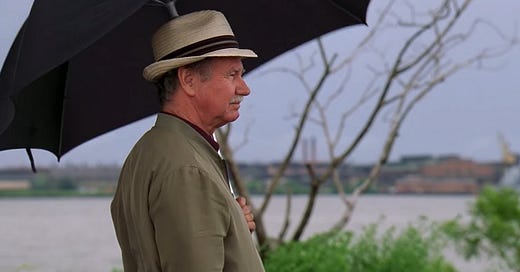
Dear Reader,
In August of 2001, we moved from the East Village to a lovely brick co-op in Astoria, Queens. That’s where we lived during 9/11 and the blackout.
Catty-corner from our building was an uninviting bar called Kelly’s. It looked more like a house than a bar, like a private residence, or the city’s lamest speakeasy. There was something off about the place. There was never anybody going in or out. There was never anybody hanging around out front. The windows were all painted over, so you couldn’t see inside. It wasn’t exactly screaming for randos to come in and have a drink. Was it a front? A brothel? An opium den? A private club full of old Italian guys playing cards? We had no idea.
One night, we had plans with our friend Rus and his girlfriend, who also lived in Queens. We decided to be adventurous and go have a drink at Kelly’s. We figured the worst that could happen was it would be uncomfortable or weird, and we’d just go down the street to Broadway Station or Gibney’s.
The front door opened into a dark, smoky bar room, where sat the handful of regulars, mostly single men, at least a generation older than us, like characters in a lesser Billy Joel song. We requested a table, and the proprietress—a stocky woman in her late 60s, maybe Italian, maybe Irish, probably both—brought us to the back room to sit down.
My great aunt Ann, like many Italian women of that generation, had a second kitchen down the basement of her split-level. That’s what the back room at Kelly’s reminded me of. There were old kitchen appliances. There were milk crates piled in the corners. There was a single table, an Art Deco timepiece that was the exact same one my aunt had, in the middle of the room. Nothing about the tableau suggested that we could sit there and be served drinks. But we sat there and were served drinks.
There was music playing through the (surprisingly good) sound system. As we had the first sips of our booze, we started to sing along. Like my wife, Rus is a musician and has a lovely singing voice. As he idly sang along to whatever tune was playing on the stereo, the proprietress materialized from around the corner, grabbed him by the arm, and urgently led him away into the main bar room. The rest of us—me, my wife, Rus’s girlfriend—exchanged puzzled glances. Where had she taken him? Was he in some sort of trouble? Would we ever see him again?
Then a familiar tune came on the sound system, and we heard what was unmistakably Rus’s voice, tentative but true, coming through the speakers:
Livin’ on sponge cake,1
Watchin’ the sun bake. . .
We raced into the next room. There was Rus, fancy microphone in hand, standing in front of a jukebox we’d not noticed when we walked in, crooning “Margaritaville” while the bar patrons—most of them older gay men, as it turned out, with good ears and a love of 1970s music—looked on with obvious delight. It wasn’t karaoke, technically, because Rus was singing along to the actual song. But it was the same general concept.
Of all the gin joints in all the neighborhoods in all the Five Boroughs, the bar closest to our apartment had this going on! Incredible!
At the urging of the enthusiastic bar patrons, we all took turns singing. My wife went first. Then Rus’s girlfriend. I did “Coward of the County,” and not very well. Some of the regulars sang, too. It wound up being one of the most random, unexpected, fun nights out in all my ten years of living in New York. After enduring 9/11 and the blackout and the horrible reality of George W. Bush in the White House, this felt like the universe reassuring us that not all surprises are bad.
I share this today because Jimmy Buffett, who wrote and sang the song Rus performed at Kelly’s all those years ago, died on Friday. The Times obituary hails him as a “roguish bard of island escapism,” which, while factually true, is not entirely accurate.
“Margaritaville,” his greatest hit—the song we all know by heart—is not about escapism, in the current sense of the word; it’s about running away to recover and heal. Despite its ubiquity, I’ve always loved it, because, first, the melody and the arrangement are great, but second, the lyrics are deceptively simple. The little blurb on AZ Lyrics informs us that “Margaritaville” concerns “a man spending an entire season at a beach resort, enjoying carefree Caribbean lifestyle with margarita cocktails,” and misses the point entirely.
Margaritaville is not a place; it’s a state of mind. And it’s not a healthy state of mind, not a lucid state of mind, not a happy state of mind. “Margaritaville” is awesome; Margaritaville sucks. What’s more, our drunken narrator knows it sucks. That’s why he calls it that, channeling the Rat Pack: to be ironic. He’s not bragging about being wasted on cheap tequila, as it appears at first glance, and as college kids who take to the song assume; he’s articulating his shame—confessing his sins—and by doing so, coming to terms with his pain.
As the song opens, we find him lazing on the swing on his front porch, idly strumming the guitar. Unlike the Coppertone’d tourists he’s studying with bemusement, he isn’t going home when the rental ends on Saturday. He’s there for the long haul. Oh, and he’s already bombed. While there is some debate over whether he sings “wasted away” or “wastin’ away” in the chorus, the meaning doesn’t really change:
Wastin’ away again in Margaritaville.
Searchin’ for my lost shaker of salt.
Some people claim that there’s a woman to blame,
But I know it’s nobody’s fault.
By “some people,” of course, he means himself. And so we learn the cause of his melancholy, and the impetus for his current fall from grace: he is heartbroken. He’s no longer with the woman he loves—we don’t know the reason; he says he doesn’t but does—and thus has turned to Cuervo and beach-bummery for solace.
The second verse humorously conveys just how low he has sunk:
Don’t know the reason
[I] stayed here all season
With nothing to show but this brand new tattoo.
But it’s a real beauty—
A Mexican cutie—
And how it got here, I haven’t a clue.
These days, Zoomers, Millennials, and a healthy percentage of Gen X all sport ink. But in 1977, when “Margaritaville” came out, the only people who had tattoos were sailors and felons. When I turned 18 in 1992, tattoo parlors were still illegal to operate in New York City. There were not that many in business in 2002, when we hung out at Kelly’s. So for this guy to get so blackout drunk that he woke up with a tattoo on his arm (we assume it’s his arm) is saying something.
Note the subtle change in the last line of the chorus on the second go-round:
Some people claim that there’s a woman to blame.
Now I think, hell, it could be my fault.
By the third verse, our narrator finally leaves the porch. He’s staggering around now, but his flip-flop breaks—the equivalent of the scene in a movie where the woman’s high heel snaps. This is made even more pathetic by him immediately cutting his foot on a bottlecap, probably discarded by one of the sunburnt tourists. Now he has no recourse but to return to the beach house, where a fresh pitcher of frozen margaritas awaits—the “frozen concoction that helps [him] hang on.”
But with this last batch of blender’d booze comes insight. At long last, he is able to accept the truth of his situation:
Some people claim that there’s a woman to blame,
But I know it’s my own damn fault.
Yes, and some people claim that there’s a woman to blame,
And I know it’s my own damn fault.
He is heartbroken. He is wallowing in self-pity. But there is no blame game—not anymore. Unlike certain FPOTUSes that come to mind, he is able to accept responsibility and own the consequences of his actions. There is no festering grievance. There is no embrace of full-on misogyny. He doesn’t start up a podcast and emulate Andrew Tate or Jordan Peterson. He doesn’t take the red pill. He doesn’t text Mark Meadows about barges coming for the Biden crime family. He looks deep within himself, admits the error of his ways, and grows from the experience.
“Margaritaville” is about a brokenhearted guy who hits rock bottom before turning his life around. That’s the genius of the song. The genius of Jimmy Buffett is that he was able to parley the chill, fun-in-the-sun vibes of his greatest hit into a commercial empire.
And who can begrudge him his success? He wrote a song compelling enough to unite the small cross-section of humanity at Kelly’s—to transport all of us from that dark, smoky Astoria bar to somewhere sunny and tropical.
Music has the power to unite us, to move us, to amuse us, to alleviate our pain. The entire purpose of Buffett’s work, it seems to me, is to get us all to feel better. Fewer purposes are more noble.
ICYMI
The journalist and author Nina Burleigh was our guest on Friday’s episode of The Five 8:
For karaoke, we break out The Clash:
Photo credit: Soo Chul Park via Pexels.
The actual lyrics are “nibblin’ on spongecake,” which makes more sense in the context of the song, as Buffett is describing not a lifestyle, but a single moment in time. But the consensus is that it’s “livin’,” not “nibblin’,” and that’s almost certainly what Rus sang.
















Thank you! Nailed it-- 💓!
“What Jimmy loved most was getting on a stage - big, small, indoors, outdoors, anywhere in the world - and changing the attitude and latitude of audiences to a vacation state of mind.”
- Key West City Commissioner Clayton Lopez 🦜 Fins up forever 🦈
Having lived in the Florida Keys for ten years, Jimmy’s ‘Changes in Latitudes, Changes In Attitudes’ strikes the right chord with me, one of his kindred spirits. 🩴 https://m.youtube.com/watch?v=Apu3HRjSpu4